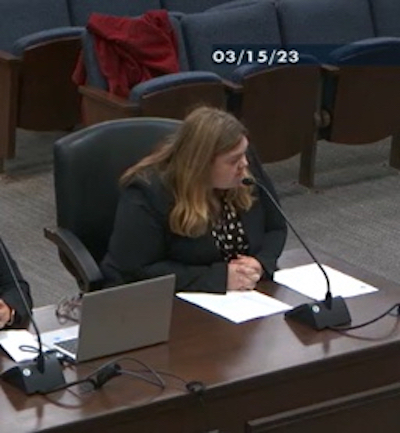APSU professor Dr. Jennifer Thompson earns I Am the Gold Standard award for advocacy from ARRT
By: Colby Wilson October 2, 2023
CLARKSVILLE, Tenn. - There’s not really a class to take to learn how to engage in public advocacy, but Austin Peay State University (APSU) professor Dr. Jennifer Thompson got a crash course anyway.
She got so good at it that she was recently recognized by the American Registry of Radiologic Technologists for her work.
The APSU radiologic technology instructor and program director joined the Tennessee State Board of Radiologic Technology and Radiation Therapy in 2019 and became deeply involved in supporting and maintaining proper licensure for radiologic technologists, a necessary measure to keep both patients and practitioners safe. Earlier this year, legislation began circulating that would loosen requirements for becoming a radiologic technologist, including removing licensure requirements.
For Thompson, this quickly went from a professional concern to a passion project to something much larger.
 Thompson became an outspoken leader of a movement that flooded social media (“We went
from having posts and concerns viewed by 100 people to tens of thousands in a matter
of weeks,” she said) and took her all the way to the floor of the state legislature,
where she became a regular figure advocating for professional standards and the profession
itself. Thompson’s advocacy campaign even convinced one lawmaker to remove his name
from the proposed bill.
Thompson became an outspoken leader of a movement that flooded social media (“We went
from having posts and concerns viewed by 100 people to tens of thousands in a matter
of weeks,” she said) and took her all the way to the floor of the state legislature,
where she became a regular figure advocating for professional standards and the profession
itself. Thompson’s advocacy campaign even convinced one lawmaker to remove his name
from the proposed bill.
Occasionally, being the largest advocate for this movement could be overwhelming. But Thompson was convinced her mission was bigger than her.
“It became my life in a lot of ways,” she said. “We would be on vacation, and my daughter would be like, ‘Turn it off,’ and I’d have to say, ‘I can’t, I’m trying to save something important to me here.’
But for Thompson, the most rewarding aspect of her advocacy was seeing it light a fire under her students to become involved.
“They wanted to go talk to legislators, they wanted to talk about how this could potentially impact them,” Thompson said. “I would take at least one student with me [to speak to lawmakers], one because it was effective to have them in the meeting to represent as the face of those who might be impacted and two, so [the students] can see how the process works. One day, maybe they'll have something that they're passionate about in life, and now they’ll know the process and how to effectively advocate for change. And I think, I hope, that it did open eyes to the fact that students are getting a really great education and will go on to impact their hospitals in a major way.”
Thompson’s advocacy isn’t limited to the profession; she’s interested in how hospitals work and how to improve those systems. At Austin Peay, she’s worked to take down barriers between radiologic technologists and other healthcare professions, encouraging collaboration at the educational level in the hope it leads to better collaboration between departments to improve healthcare in a hospital setting as well.
Last week, Thompson’s relentless work was recognized by the ARRT with their prestigious I Am the Gold Standard award. This honor is reserved for technologists who show extreme dedication to protecting and promoting the profession. Engaging students in advocacy work was also considered an innovative achievement by the ARRT. Thompson demonstrated strong leadership under difficult circumstances and continues to be a tireless advocate, now turning her attention to advising other states’ organizations on effective advocacy tactics.
According to the ARRT, the award goes to those who “have shown a substantial commitment to the profession by leading a volunteer effort or by achieving significant accomplishments outside of work responsibilities.”
“I’m grateful for the honor,” Thompson said. “We’re continuing this work in other states, and I have been so encouraged to see technologists and other professionals from Georgia, Louisiana, Missouri, Kentucky, North Carolina and South Carolina reaching out to learn how they can be advocates, what questions to ask, who to talk to and how to get meetings with their own legislators. The work is important, and it continues.”
